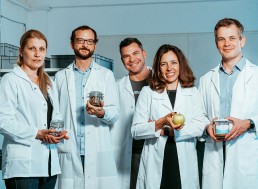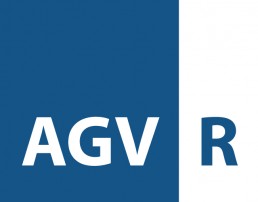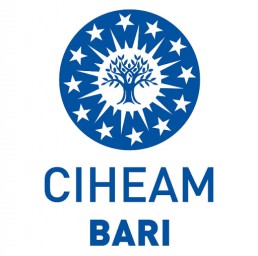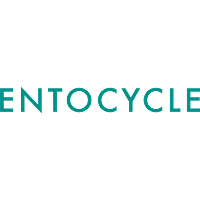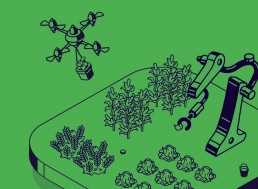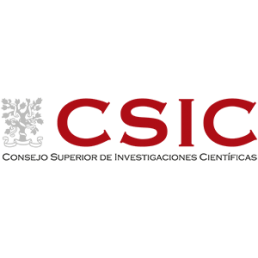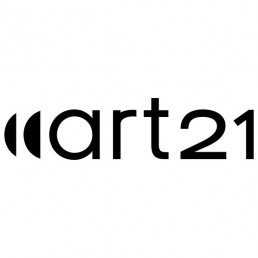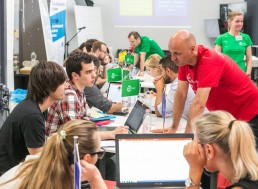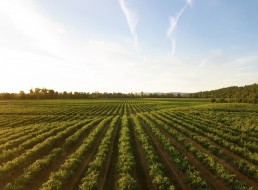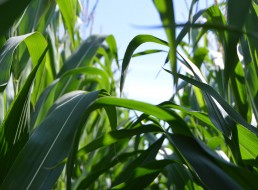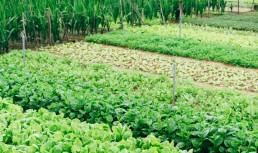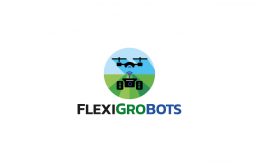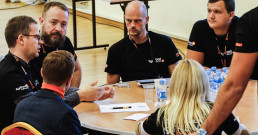Robotics4EU
Robotics with and for Society – Boosting Widespread Adoption of Robotics in Europe
The aim of Robotics4EU is to ensure a more widespread adoption of (AI-based) robots in healthcare, inspection and maintenance of infrastructure, agri-food, and agile production. It will be reached through the implementation of the responsible robotics principles among the robotics community that results in societal acceptance of the robotics solutions in application areas. Robotics4EU will create and empower the EU-wide responsible robotics community representing robotics innovators from companies and academia in the fields of healthcare, inspection and maintenance of infrastructure, agri-food, and agile production as well as citizens/users and policy/decision makers by rising awareness about non-technological aspects of robotics (ethics, legal, socioeconomic, data, privacy, gender) by organising community building and co-creation events bringing together robotics community and citizens, advocating for the responsible robotics among all stakeholder groups, incl. policy makers, developing a responsible robotics maturity assessment model and bringing the project results to the standardization bodies.
Robotics4EU will implement the following set of activities: 1) assessing the needs and developing a responsible robotics maturity assessment model that is a practical tool for the robotics developers and helps them to strategically plan and the uptake of the legal, societal and ethical aspects of robotics; 2) empowering the robotics community by organising capacity building events in healthcare, agri-food, agile production and infrastructure; 3) assessing robotics ideas and applications provided by the industry with end-users (via online consultation and co-creation workshops); 4) reaching out to the policy makers by compiling a responsible robotics advocacy report, organising a high-level policy debate and transferring the results to the standardization bodies.
The Robotics4EU project has received funding from the European Union’s Horizon 2020 research and innovation programme under grant agreement No 101017283.
Project website: https://www.robotics4eu.eu/
Project coordinator: CIVITTA Eesti AS (Estonia)
Project partners:
- AgriFood Lithuania DIH (Lithuania)
- Fonden Teknologiradet (Denmark)
- Globaz, S.A. (Portugal)
- Laboratoire National de Metrologie et d’Essais (France)
- Mittetulundusuhing Robotex (Estonia)
- Norges Teknisk-Naturvitenskapelige Universitet NTNU (Norway)
CoRoSect
Cognitive Robotic System for Digitalized and Networked (Automated) Insect Farms
By 2030 over 9 billion people, along with animals raised for food or kept as companions, will need to be fed, generating inconsistencies between the demand and supply of food resources and promoting food insecurity by rendering food as unavailable, unaffordable, unevenly distributed or unsafe to eat. Therefore, food security represents the big challenge of the 21st century and in that context one promising potential sustainable solution is insect farming. Edible insects are set to be approved in EU by late 2020 as novel food and insects also being a value food sources for farming animals; however research, innovation, farming protocols development and standardization, and a technology leap by robotizing and automatizing the mass rearing in insect farms is needed in order to concurrently scale the production and dramatically decrease the production costs.
CoRoSect addresses the dramatic need of coupling research on bionomics and life cycle of insects intended to be used as food and feed, with new robotic tools and protocols for mechanization and automation of insect farming, which is a critical point stressed by the Technical Expert Consultation on Assessing the Potential of Insects as Food and Feed in Assuring Food Security. CoRoSect forms a novel integrated cognitive robotic ecosystem where the repetitive but also cognitively and physically demanding tasks requiring increased manual effort or continuous human supervision during the insects’ life cycle, are replaced by automatic robotic-based procedures which will also draw upon research performed on understanding biological, technical and economic requirements of insect rearing and optimizing all involved processes. Focusing on real insect rearing problems, CoRoSect technologies will be evaluated through large-scale pilots in 5 insect farms placed in 5 European countries rearing three of the most commonly occurring species, thereby contributing essentially to a secure and sustainable food supply in Europe.
The CoRoSect project has received funding from the European Union’s Horizon 2020 research and innovation programme under grant agreement No 101016953.
Project website: https://corosect.eu/
Project coordinator: Universiteit Maastricht (Netherlands)
Project partners:
- AgriFood Lithuania DIH (Lithuania)
- AGVR BV (Netherlands)
- ATOS IT Solutions And Services Iberia SL (Spain)
- Centro Internazionale Di Altistudi Agronomici Mediterranei (Italy)
- Entocycle LTD (United Kingdom)
- Entomotech SL (Spain)
- Ethniko Kentro Erevnas Kai Technologikis Anaptyxis (Greece)
- Field Lab Robotics BV (Netherlands)
- Foodscale Hub Entrepreneurship Andinnovation Association (Serbia)
- Fundacion Para Las Tecnologias Auxiliares De La Agricultura (Spain)
- Hochschule EMDEN/LEER (Germany)
- Invertapro AS (Norway)
- Katholieke Universiteit Leuven (Belgium)
- Luonnonvarakeskus (Finland)
- Nasekomo AD (Bulgaria)
- Oulun Ammattikorkeakoulu OY – Oulu University of Applied Sciences (Finland)
- Robotnik Automation SLL (Spain)
- Societa Agricola Italian Cricket Farm SRL (Italy)
FlexiGroBots
Flexible Robots for Intelligent Automation of Precision Agriculture Operations
Agricultural robotics solutions can integrate a variety of robots for a variety of monitoring and targeted intervention tasks, to increase farm productivity, efficiency and sustainability through support of automated precision farming operations. Despite the rising farmer investment in farm/agricultural robots, most deployable robotic systems are meant to automate only specific tasks. The wide variety of tasks that need to be fulfilled in a single precision agriculture operation or mission makes it extremely unprofitable to address its automation with task-specific robots. These challenges result in a lack of flexibility of current heterogeneous multi-robot systems that poses low returns on investment and high risks for farmers. In order to become cost-effective, heterogeneous multi-robot systems needs to become more flexible by employing more versatile (e.g. multi-task) robots which collaborate to accomplish complex missions; ensuring scalable human oversight and intervention through adaptive mission control mechanisms (e.g. without information overload /overwhelming effort from the farmer); allowing the farmer to profit from robotics operational data.
FlexiGroBots proposes a Platform for developing heterogeneous multi-robot systems and applications which allows for i) more versatility by using the same robots for different observation and intervention tasks, in different missions, throughout the crop life cycle, ii) more cooperation between heterogeneous (ground and aerial) robots to accomplish more complex missions; iii) more valuable data to generate accurate insights into the fields, crops and robotics operations by combining data from IoT sensors, satellites and data collected by the robots; iv) more autonomy for real-time adaptation of mission plans as well as robot behaviour at the crop level, given operational conditions and real-time insights; v) more precision to carry out specific tasks in a very localized way, gaining accuracy and lowering costs.
The FlexiGroBots project has received funding from the European Union’s Horizon 2020 research and innovation programme under grant agreement No 101017111.
Project website: https://flexigrobots-h2020.eu/
Project coordinator: ATOS IT Solutions and Services Iberia SL (Spain)
Project partners:
- Agencia Estatal Consejo Superior De Investigaciones Cientificas (Spain)
- AgriFood Lithuania DIH (Lithuania)
- Agrosmart SIA (Latvia)
- Biosense Institute – Research and Development Institute for Information Technologies in Biosystems (Serbia)
- Bodegas Terras Gauda SA (Spain)
- Centre for European Policy Studies (Belgium)
- International Data Spaces EV (Germany)
- Luonnonvarakeskus (Finland)
- Mtech Digital Solutions OY (Finland)
- Probot OY (Finland)
- Seresco SA (Spain)
- Teknologian Tutkimuskeskus VTT OY (Finland)
- UAB ART21 (Lithuania)
- Wageningen University (Netherlands)
- Zeleni Hit doo Beograd (Serbia)
EIT Jumpstarter
EIT Jumpstarter is a very selective, competitive program; participating in it opens doors towards the European markets and connects the best teams with the three EIT Communities’ large industrial partners such as GE Healthcare, Siemens, Philips, Roche, Bosch, Nestlé, Pepsico and Maspex, among others.
During the 8 months-long programs, you will find and validate the best business model for your innovative idea. The courses build on the lean start-up methodology from Silicon Valley translated to the European Environment. You will learn about: how to refine your deal, market segmentation, customer value proposition, market segmentation, financials, investment basics, legal basics
You will receive travel and accommodation support during the program, and the best teams in each category will have the chance to win a €10,000 money prize.
Interested? Follow the timeline and the information: https://eitjumpstarter.eu/
Important dates
- Deadline for submitting business ideas: 30 April 2021 at 23:59 CET
- Selection of ideas and invitation of the bootcamps: 16th May 2021.
- Bootcamps will be held online in June 2021
- Local joint training: September 2021
- Grand Final: November 2021
Deadline for Applications: Until April 30
TEST FARM
Have you created an innovative solution that can make a positive change and improve agricultural practices? Test Farms programme will help to validate your agritech technology or product in real conditions and increase your chances for commercial success! You will get the funding of 3 000 euros! For whom? For startups with the innovative prototypes for agricultural challenges.
Click here: https://www.f6s.com/test-farms-2021
Have any questions? E-mail us at hub@agrifood.lt
Deadline for Applications: until April 30
TEAMUP
TeamUp matches leading technologists with top business professionals and supports them in building impactful agrifood ventures. We help you find the right co-founder and provide expert guidance, training, networking, and funding to help you grow your agrifood startup.
For whom?
1) For people with agrifood technologies or solutions;
2) For people with skills and experience to build an agrifood startup.
Apply here: https://www.eitfood.eu/projects/teamup
Deadline for Applications: until April 30
Registration to TEST FARM has already started
Have you created an innovative solution that can make a positive change and improve agricultural practices? Test Farms programme will help to validate your agritech technology or product in real conditions and increase your chances for commercial success! You will get the funding of 3 000 euros! For whom? For startups with the innovative prototypes for agricultural challenges.
Click here: https://www.f6s.com/test-farms-2021
Have any questions? E-mail us at hub@agrifood.lt
Deadline for Applications: until April 30
FlexiGroBots, EU-funded project for enabling efficient and automated precision agriculture operations using flexible multi-robot systems
The project focuses on the development of a novel platform for building mission control of heterogeneous multi-robot systems which will be validated of three real-life scenarios: grapevines, rapeseeds, and blueberries.
Madrid, Spain. March 22, 2021. Coordinated by the Research and Innovation hub of the Atos Group in Spain, FlexiGroBots project started officially on the 1st of January of 2021 funded by the European Commission under the Horizon 2020 Programme within the topic of robotics for agri-food and agile production which envisioned the establishment of large-scale pilots, addressing both technical and non-technical issues, such as socio-economic impact, novel business models, ethical issues, and connections to AI, Big Data and IoT.
The adoption of novel technologies by the agriculture sector has increased in the past years, unleashing a new paradigm – Agriculture 4.0. Within it, robotics, AI and automation play a major role in crop production and precision agriculture operations, optimising resources based on relevant data. Nevertheless, there is a gap between the installed and the real performance of different types of robots used for specific tasks.
FlexiGroBots project will run for 36 months with the main objective of creating and validating its open platform for flexible heterogeneous multi-robot systems including Unmanned Aerial Vehicle (UAVs) and Unmanned Ground Vehicle (UGVs). The platform will integrate existing technology platforms and components provided by various digital transformation initiatives and ecosystems, for addressing the most imperative needs of the Agriculture sector in terms of multifunctional robots, multi-robot cooperation, autonomy and awareness, and actionable data.
Through the FlexiGroBots platform, the project aims to empower roboticist, engineers, and service providers to build and deploy flexible heterogeneous multi-robot systems in the Agri-Food sector, while also providing various benefits to farmers around the world:
– Versatility for using the same robots for different observation and intervention tasks throughout the crop life cycle
– Cooperation between ground and aerial robots for more complex missions
– Relevant data to power AI-driven agricultural operations
– Autonomy for real-time adaptation of mission plans and robots’ behaviour at crop level
– Precision in agricultural operations to carry out accurate tasks, hence reducing costs and environmental footprint
Furthermore, the platform foresees an agricultural data space integrating a set of common data services to enable data collection and integration, publication and sharing, and security and trust, following the International Data Space Association reference architecture, and considering also data coming from geospatial data platforms such as Copernicus and Information Access Services (DIAS).
The FlexiGroBots platform and its different components will be demonstrated and validated within three real-life pilots of significant economic value, posing different levels of complexity regarding crops, number and types of robots used from one side, and varying levels of complexity in relation to geographical regions, weather conditions and national regulations, on the other.
This project has received funding from the European Union’s Horizon 2020 research and innovation programme under grant agreement No 101017111
– Grapevines (Spain): Demonstrate the high capacity and versatility of robots to carry out different tasks in vineyards, contributing to the economic profitability and quality of grapes for wine production.
– Rapeseeds (Finland): Demonstrate time-critical pest management and robotization of heavy machinery fleets in grassland management.
– Blueberries (Serbia and Lithuania): Demonstrate the potential of novel robotic solutions for blueberry farming supported by advanced remote sensing, deep learning, and decision-support techniques.
FlexiGroBots brings together a multidisciplinary consortium composed of 16 different organisations and companies, from 8 different countries, with different areas of expertise that makes it possible to build the platform and its services, define the validation roadmap and activities on the three scenarios, and outline the go-to-market and sustainability plan for the expected results. The project will also provide a consolidated report on ethical AI in Agri-Food based on the lessons learned throughout the execution of the project.
The partners are Atos (Spain), Spanish National Research Council – CSIC (Spain), Seresco (Spain), Bodegas Terras Gauda (Spain), Centre for European Policy Studies -CEPS (Belgium), Wageningen University & Research (Netherlands), International Data Spaces Association – IDSA (Germany), BioSense Institute (Serbia), Zeleni hit (Serbia), Art 21 (Lithuania), AgriFood Lithuania, Agrosmart (Latvia), Probot OY (Finland), Natural Resources Institute Finland – LUKE (Finland), VTT Technical Research Centre (Finland), and MTECH Digital Solutions (Finland).
Quote:
“FlexiGroBots will enable farmers, farmer associations and the agriculture industry to use multi-robot systems for intelligent automation of farm operations, increase farm production efficiency and economic sustainability. On top of that, the project will also benefit Digital Innovation Hubs (DIHs) throughout Europe, which are specialized in robotics, agriculture and associated fields, as well as innovation developers and agriculture service providers including SMEs working in close cooperation and proximity to farmers” Daniel Calvo Alonso, Head of the AI, Data & Robotics Unit at Atos Research and Innovation, and FlexiGroBots Project Coordinator.
For more information, visit: flexigrobots-h2020.eu
Follow FlexiGroBots on Twitter and LinkedIn, and subscribe to its biannual newsletter for more information on the progress and results achieved.
About FlexiGroBots:
FlexiGroBots – Flexible robots for intelligent automation of precision agriculture operations – is an EU-funded project under the Research and Innovation programme H2020 of the European Commission with the Grant Agreement Nº101017111. FlexiGroBots goal is to make multi-robot systems cost-effective for precision agriculture operations by developing a platform able to make them flexible enabling versatility, collaboration, scalability, autonomous capabilities, and in general, ensuring a data economy that facilitates the development of AI-driven capabilities on robots.
For further information about the project, please contact FlexiGroBots Project Coordinator, Daniel Calvo Alonso, Atos: daniel.calvo@atos.net, and for any media/communication enquiries contact FlexiGroBots Communication Manager, Ana María Morales, Atos: ana-maria.moralesperez@atos.net.
Registration for the online regional hackathon HACK AgriFood’20 has started
AgriFood Lithuania DIH, together with international partners, has announced the beginning of registration for the regional online two-day hackathon HACK AgriFood’20, which will take place on November 21-22, 2020. Participants will be able to choose from 18 unique challenges, divided into 6 different categories, that the agri-food sector is facing today.
During the two-day hackathon innovators from Lithuania and neighboring countries will:
- get mentorship and guidance from experts at the top of their fields;
- have the opportunity to pitch their ideas during the international AgriFood Forum 2020;
- compete for a solid cash prize;
- be invited to participate in unique interactive entertainments.
Anyone interested can join HACK AgriFood’20 at www.hackagrifood. Registration for the hakathon will be open until November 18.
Challenge categories: Fighting food loss and food waste; Crisis-averse horticulture; Mitigating labor shortage; Smart animal husbandry; Side-stream valorization; Boosting local production
Europe's eyes are on Lithuania: the International AgriFood Forum 2020 is being organized
Agriculture is approaching the breaking point: the European Green Deal, the reform of the Common Agricultural Policy, the ongoing process of digitalization and the world’s response to the COVID-19 pandemic crisis will fundamentally change the perception of productivity, sustainability and technology in the agri-food industry. The main trends in the sector will be discussed in detail at the International AgriFood Forum 2020, which will take place remotely on 26-27 November. The event is designed for business, decision makers, farmers and anyone interested in the prospects in this area. Participation in the forum is free of charge, but due to the limited number of people who can join, pre-registration is required.
The organizers of the event – the AgriFood Lithuania DIH and the European Parliament (EP) Liaison Office in Lithuania – emphasize that decisions made today will determine the long-term future of agricultural and food industry. "At the end of October, the European Parliament voted in favor of making the agricultural policy of the EU more flexible, sustainable and resilient to crises. MEPs will seek to ensure that a significant proportion of support is dedicated to combating climate change and ensuring biodiversity. In the past, The European Parliament has advocated solutions that reduce the use of fertilizers and antibiotics in food the production and shorten the food supply chain. In the near future, the funds of the Economic Recovery Fund should reach Europe. These funds can become the basis for the transformation towards a more sustainable agriculture and food production,” Daiva Jakaitė, the Head of the EP Liaison Office in Lithuania, explained.
According to Kristina Šermukšnytė-Alešiūnienė, the Managing Director of the AgriFood Lithuania DIH, the pandemic has brought many changes and Europe has to respond urgently. Digital transformation proposed by the European Commission has become a key response to the crisis, which will make countries and businesses, determined enough to seize this opportunity, more sustainable and stronger than ever before.
Speakers of the forum - leaders from all over Europe
Today, the topic of the AgriFood Forum 2020 is more relevant than ever before. A great proof of this is the list of speakers, which consist of leading European and Lithuanian experts, politicians, entrepreneurs and decision-makers from the European Commission. It includes Members of the European Parliament Juozas Olekas, Bronis Ropė and Petros Kokkalis, the President of the Lithuanian Confederation of Industrialists Vidmantas Janulevičius, the Director of the EIT Food Consortium Marja-Liisa Meurice, the President of the European Clusters Alliance Antonio Novo Guerrero, the Managing Partner of the Iron Wolf Capital Venture Capital Fund Kasparas Jurgelionis, CEOs of Agrokoncernas, Dojus Agro, Scandagra Baltic and many others. The full list of speakers is available on the official forum website.
According to Grigoris Chatzikostas, one of the moderators of the AgriFood Forum 2020 and the co-pioneer of Digital Innovation Hubs in Europe, COVID-19 tested the resilience of our food systems but it also accelerated the adoption of game-changing technologies. G. Chatzikostas believes that this forum is a meeting space where different actors of food ecosystems - farmers, technology developers, entrepreneurs, food chain suppliers, decision-makers and consumers – can reach an agreement, make decisions and take actions in order to transform the agri-food sector and create a greener, more sustainable and prosperous future.
Focus on Europe and Lithuania
The AgriFood Forum 2020 will take place on 26-27 November. The first day of the event will focus on decisions and strategies of the EU, and on the second day the future of the Lithuanian agri-food industry will be in the spotlight. The number of people who can join is limited, so those wishing to participate are encouraged to register in advance.
This forum is a continuation of the International Agro Business Forum held in Vilnius City Hall in 2019, during which a memorandum was signed. The purpose of the Memorandum was to promote further cooperation between different actors of the agri-food ecosystem, to form an infrastructure supporting the development of digital innovations in Lithuania and to ensure the necessary funding. All of these goals have been successfully achieved.





